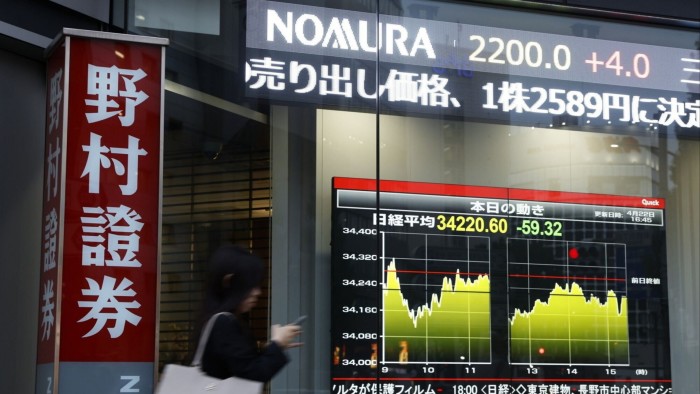Unlock the Editor’s Digest for free
Roula Khalaf, Editor of the FT, selects her favourite stories in this weekly newsletter.
Nomura, Japan’s biggest investment bank and brokerage, took advantage of volatile US equity markets after the election of President Donald Trump to help boost quarterly profits ahead of analyst expectations.
The group reported net income of ¥72bn ($502mn) in the three months to March, up 27 per cent year-on-year and beating an analyst consensus of close to ¥64bn, according to Bloomberg data.
Nomura said revenues from equity trading, which rose 24 per cent, were “up steeply in the Americas amid higher volatility and increased client activity,” mirroring the experience of Wall Street banks, according to their latest earnings reports.
Dealmaking fees were also up 5 per cent year on year, but revenues from fixed income fell 14 per cent. Overall, the wholesale unit, which encompasses trading, investment banking and international wealth management businesses, saw revenues increase 2 per cent.
At a news briefing on Friday, chief financial officer Takumi Kitamura said the recent volatility had been “very positive” for the bank but it would continue to manage risks carefully.
The head of the wholesale unit, Christopher Willcox told the FT recently that his traders were getting closer to being able to go “max risk”, and take advantage of market turmoil, due to the “boring, foundational” reforms he had put in place.
Willcox was parachuted into the bank four years ago from JPMorgan Chase and handed responsibility for overhauling the wholesale unit, which had been hit hard by the collapse of the Archegos family office in 2021.
The results, which mean Nomura closes out a year of record profits, are a boost for chief executive Kentaro Okuda. He has been trying to shift towards stickier sources of revenue, to take advantage of Japanese savers reaching for yield as inflation returns to the country.
Although both wealth management and investment management saw fiscal fourth-quarter results suffer slightly in comparison to the same period last year — when markets were rallying — they had record years overall.
Kitamura added on Friday that wealth management clients had been undeterred by ongoing volatility. “In April, net inflows to our funds continued. I think some investors are a little nervous about the big movements in the market, but it is not something overly worrying because investments are medium- to long-term things.”
The previous financial year represented the first time under Okuda’s watch that the bank recorded annual profit growth. This year, and despite some notable scandals in Japan, the bank saw net income increase to ¥340.7bn, more than doubling the 2024 result of ¥166bn.
As part of Okuda’s strategy, the bank this week said it had agreed to buy Macquarie’s US and European public asset management business for $1.8bn, its biggest deal since the troubled 2008 purchase of Lehman Brothers’ Asian and European assets.
According to people familiar with the matter, the bank is also considering deepening its cash prime brokerage operations in the US and Europe, businesses it largely exited following the Archegos debacle. Nomura said it was its policy not to comment on media reports. The news was first reported by Bloomberg.
On Friday, the bank also announced plans to buy back up to 3.2 per cent of its shares for as much as ¥60bn. Its stock had closed 0.5 per cent higher in Tokyo on Friday but is down almost 10 per cent over the past year.




